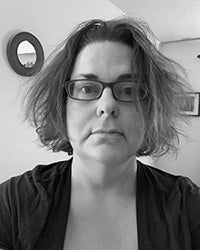
Kerri Webster, poet and lecturer in the Boise State creative writing program, will step down from her position at the end of the fall 2022 semester.
“After 25 years in academia, it’s time for something new,” Webster said. “I rest easy knowing I’m leaving the program in better shape than it’s ever been.”
The heart of the program
After completing her undergraduate studies in creative writing at Boise State, Webster returned as faculty, teaching and mentoring students and shaping the creative writing MFA program into one of the most renowned in the country.
“I have always said that Kerri is not only the heart and brains of the program, but also its conscience,” Braden Udall, a professor in the program, said. “She has always put the concerns and needs of the students first, and has helped to build and nourish our programs in so many ways. Frankly, I don’t know what we’re going to do without her.”
As a lecturer, Webster taught graduate and undergraduate courses, chaired and sat on MFA thesis committees, served as poetry editor for the Idaho Review, designed and taught the graduate teaching seminar, began an archive of teaching materials for teaching assistants, acted as undergraduate advising coordinator, served on the MFA Admissions Committee, and mentored both undergraduate and graduate students. During her time at Boise State, she wrote and published her third and fourth books, “The Trailhead” and “Lapis” (Wesleyan University Press 2018 and 2022), and received grants from the Idaho Commission on the Arts and the Alexa Rose Foundation.
In her 25 years of teaching, Webster served students of all ages and skill levels in the Treasure Valley and made a point to mentor local writers and graduate students.
A beloved teacher and mentor
An dedicated teacher and mentor, Webster earned a reputation as a fierce advocate for her students.
“Kerri’s influence as my beloved professor and mentor is uncountable,” said Laura Roghaar, a student of Webster’s. “She’s the best poet, the gentlest mentor and a loyal forever friend to her students. From her example, I learned that radical teaching could be deciding to garden what’s already growing. She showed me how cultivating a quiet and slightly frightening partiality to my own poems is a mode of love. I’ll have these gifts all my life.”
A celebrated poet
The recipient of a Whiting Award, the Iowa Poetry Prize and the Lucille Medwick Award from the Poetry Society of America, Webster authored four books of poetry.
“I can truly say that I have not read anyone like her in contemporary poetry,” said Emily Pittinos, a colleague and author of the poetry collection “The Last Unkillable Thing.” “Her poems roil with a quality of language that is both inventive and gorgeous. Her lines have the power to leave one weak or laughing, furious and thoughtful. I use her work as examples for teaching students about what the nimbleness of form can do, as well as how to exact a wincing bareness of feeling and the most authentic image.”
Pittinos admires not only Webster’s language and form, but also her subjects.
“Her work is often topical and dares to explore politicized issues such as mental illness and the expectations set for women by society and religion, as well as difficult interpersonal areas like abusive relationships and resilience,” Pittinos said. “She is a poet who brings to life an often untold story of contemporary womanhood and is a feminist voice that will influence and encourage the emergence of many others. I have seen, in real time, how Webster’s work has empowered young people of all genders to expose their own depths on the page.”